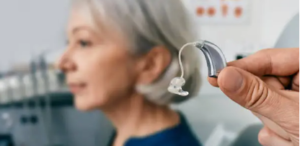Children with APD find it hard to ‘tune out’ background noise and concentrate on what is being said. It means they must work harder than their peers to understand and learn.
 APD can be diagnosed by a qualified audiologist who will carry out various tests in a controlled environment. These include trials assessing their ability to locate sounds, discriminate sounds and identify different words. For professional SASHC auditory processing disorder Adelaide services, check this out.
APD can be diagnosed by a qualified audiologist who will carry out various tests in a controlled environment. These include trials assessing their ability to locate sounds, discriminate sounds and identify different words. For professional SASHC auditory processing disorder Adelaide services, check this out.
What is APD?
Auditory processing disorder (APD) is a hearing loss that affects the brain’s ability to process sounds accurately. Someone with auditory processing difficulties may have normal hearing and an above-average IQ. Still, they cannot correctly map their sounds into the sound they understand. They can’t distinguish between two tones or recognise the order of speech sounds.
It makes learning difficult for children with APD, especially in noisy environments like classrooms. They often miss information, misunderstand instructions and struggle to remember the phonics basis of reading. They may also find it hard to concentrate, appear distracted or ‘dreamy’ and ask for things to be repeated.
It is not fully understood what causes APD, but it’s thought that there may be a problem with how the central nervous system processes sensory input from the ears. Diagnosis can be challenging because the symptoms are similar to those of other conditions, such as deafness or hearing loss, intellectual disability, dyslexia and attention deficit hyperactivity disorder (ADHD).
A qualified allied health professional must assess a child with APD. A child can be referred by their GP or school to an audiologist who can confirm whether or not the difficulties they’re experiencing relate to their auditory processing abilities.
A qualified audiologist (hearing professional) will perform various tests to measure your child’s listening skills. For example, they will repeat sentences that become softer against background noise to see how well your child can distinguish speech from competing signals. They will also ask your child to listen to one sound in each ear and then try to match them up, called phonetic decoding.
Our audiologist at South Australia Speech and Hearing Centre is dual qualified and specialises in formally diagnosing APD. We recommend starting children on the Sound Scouts test at four to give them a “heads-up” and prevent them from struggling in their early school years.
Treatment
APD can be hard to diagnose. It is because a child’s difficulties with listening can look like the symptoms of deafness or hearing loss, intellectual disability, language difficulty or learning disability, or attention deficit hyperactivity disorder (ADHD).
People with APD have normal hearing but struggle to ‘make sense’ of the sounds they hear. They have difficulty separating speech from background noise, understanding the words they are hearing and putting together sentences. It can make it difficult for them to follow directions, learn in a noisy classroom or keep up with their friends.
Support
Auditory Processing Disorder can often be challenging to diagnose because the difficulties it causes are similar to those of deafness or hearing loss, an intellectual disability, a language or learning problem, attention deficit hyperactivity disorder (ADHD), or other mental health issues.
It is estimated that 2-5% of school-age children have APD.
When a child has APD, they may be able to hear the teacher in class, but because they can’t distinguish the sounds of different words, they do not understand the instructions. They might also have trouble with environmental sounds and remembering verbal instructions. It can also cause them to become easily distracted and miss important information in social situations.
People with APD can use coping strategies to help them listen and learn, such as moving closer to the speaker or amplifying their voice, which can make a difference. However, these strategies only address the symptoms and do not change the underlying cause. Skills building is needed, i.e., training the brain to process sound correctly and quickly.
South Australia Speech and Hearing Centre (SASHC) is an independent service provider dual-qualified in speech pathology and audiology and specialises in formally diagnosing APD and working with the individual to maximise outcomes. Our comprehensive Auditory Processing Disorder assessment can help determine if your child has APD and what support is available. For professional SASHC auditory processing disorder Adelaide services, check this out.